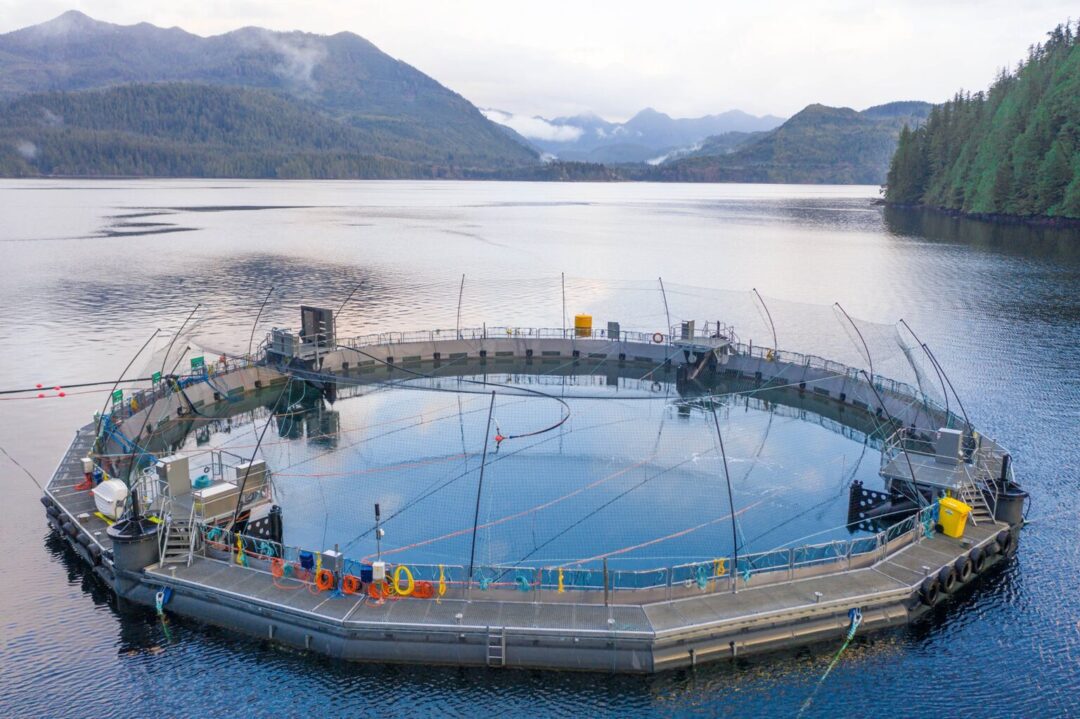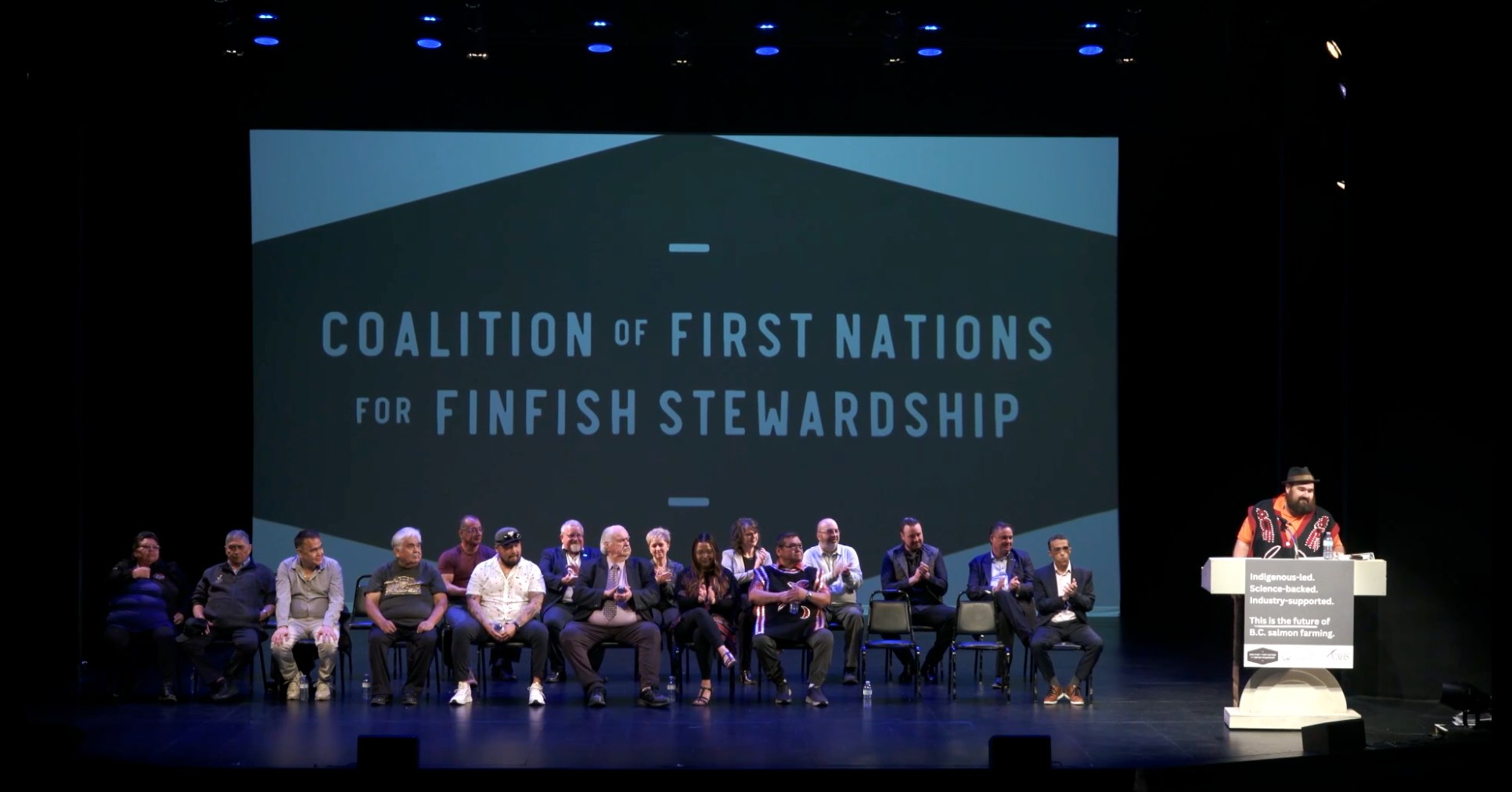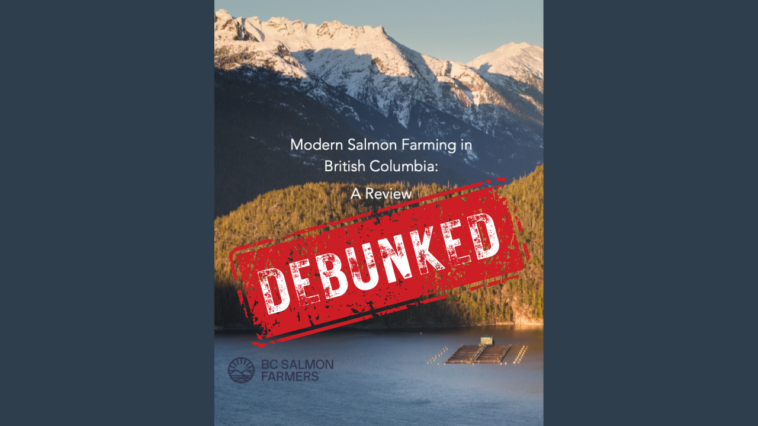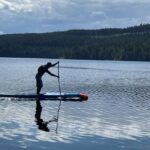Fish and wildlife experts are calling out the scientific claims behind a new ‘textbook’ released by a coalition of BC salmon farming proponents. The 500-page publication, Modern Salmon Farming in British Columbia: A Review, aims to dispel concerns about open-net salmon farms ahead of the looming deadline for Fisheries and Oceans Canada (DFO) to decide the fate of salmon farming in the province. Scientists like Stan Proboszcz, Watershed Watch Salmon Society’s Senior Science and Policy Analyst, call the report a “fairytale” that misrepresents the science.
Published last week by the BC Salmon Farmers’ Association (BCSFA), the Coalition of First Nations for Finfish Stewardship, and the BC Centre for Aquatic Health Sciences, the report defends the controversial aquaculture industry against the widely accepted science that says salmon farming has harmful effects on wild fish and surrounding ecosystems.
“We asked the BCSFA to put together a ‘textbook’ of information on fish farms that would answer the questions coming from our members,” said Dallas Smith, spokesperson for the Coalition of First Nations for Finfish Stewardship (FNFFS) and member of the Tlowitsis Nation, in a statement.
He said he hoped that from reading the report, “our Indigenous communities can make more informed decisions regarding the future of finfish aquaculture in our waters and the sector’s role in our marine management planning on the coast.”
However, wildlife scientist Stan Proboszcz is highly critical of the document and the science it selectively includes. “I’d hate to see the school that uses this as a textbook,” he said. “It’s hardly an objective document and has not gone through any sort of independent peer-review that I can see,” he added, skeptical of the lack of authors or editors attached to the report.
Within the report, Proboszcz located several instances of information taken out of context that misrepresents the conclusions of scientific studies – even from a paper he himself co-authored. For example, Modern Salmon Farming references a study he did on herring louse, the most common louse found on wild salmon on the north coast of BC. The textbook quotes the paper, reading: “Compared to the salmon louse (L. salmonis), the herring louse is not likely to cause direct mortality of juvenile sockeye salmon (15).”
“To the layperson, because they do mention a few of these independent papers, it may appear they’re attempting to be unbiased. But it’s really a piece of junk to anyone that’s studied this industry.”
Stan Proboszcz, wildlife scientist
But Proboszcz said this “cherry-picks” the facts to make salmon farms’ lice problem seem mild. “The report simply avoids our findings and conclusion,” he said, saying the study found wild salmon living downstream of salmon farms have much higher incidences of lice, which are harmful to salmon regardless. “This is the first study to demonstrate a potential role of salmon farms in sea lice transmission to juvenile sockeye salmon during their critical early marine migration,” Proboszcz’s research concludes.
“To the layperson, because they do mention a few of these independent papers, it may appear they’re attempting to be unbiased. But it’s really a piece of junk to anyone that’s studied this industry,” he told us.
Deadline Looms

The report comes ahead of DFO’s decision to determine if fish farming licenses in BC will be extended from two to six years. Environmental experts have expressed concern about this possible extension, saying it is out of step with the Prime Minister’s pledge to develop a transition plan to remove open-net pen salmon farming in BC waters by 2025.
In 2019, the Liberal government had originally committed to removing open-net fish farms from BC waters by 2025 out of concern for the health of wild fish populations. The decision was grounded in scientific evidence proving that fish farms breed parasites and diseases that transfer to the smolts, putting wild salmon populations at risk.
“If we’re supposed to have a plan to transition from open nets by 2025, and we don’t have that plan yet, why are we even considering two to six-year licences when that would put us beyond that deadline?”
Stan Proboszcz, wildlife scientist
The federal government then backtracked on that commitment, saying it would instead release a transition plan for the open-net pen farms by the 2025 deadline. “If we’re supposed to have a plan to transition from open nets by 2025, and we don’t have that plan yet, why are we even considering two to six-year licences when that would put us beyond that deadline?” asked Proboszcz at the time. “It’s putting the cart before the horse.”
Indigenous Division

Indigenous communities in the province remain divided about the future of open-net pen salmon farming in BC waters. Dallas Smith’s First Nations for Finfish Stewardship advocates for 17 Nations, like Wei Wai Kum and Tlowitsis First Nations, with formal agreements with aquaculture companies.
On the opposing side, First Nation Wild Salmon Alliance (FNWSA) is a coalition of over 120 First Nations across BC who support the transition of open-net pen salmon farms out of provincial waters. In response to the release of the ‘textbook,’ Bob Chamberlin, chairman of the FNWSA, told the Campbell River Mirror it was “like marking your own homework, giving yourself an A-plus. No?” Chamberlin went on to say, “We’ve provided DFO with, I think, three three-inch binders of science that show the contrary position.”
“The overwhelming majority of First Nations in BC oppose the commercial fish farm industry due to title and rights, food security concerns, and the detrimental effects it has on wild salmon.”
Grand Chief Stewart Phillip, President of the Union of BC Indian Chiefs
DFO came under fire last year for expanding the salmon farm licenses of aquaculture conglomerate Cermaq Canada near Tofino ahead of the 2025 deadline. In response, 22 environmental and First Nations groups jointly signed an open letter to the federal government calling on then-Minister Murray to stop the expansion of the Tofino fish farms. The letter expressed concern over “all-time historic lows” of wild salmon populations and criticized the fish farm approvals that went through with “no public consultation or input.”
“The overwhelming majority of First Nations in BC oppose the commercial fish farm industry due to title and rights, food security concerns, and the detrimental effects it has on wild salmon,” said Grand Chief Stewart Phillip, President of the Union of BC Indian Chiefs, in a release at the time.
Celebrity Influence

The debate on salmon farming in BC has been heating up – even actor Leonardo DiCaprio weighed in and posted about the license extension to his 62.1 million Instagram followers on March 28th. “The Canadian government is considering extending the licenses for open-net pen salmon farms in British Columbia (BC) by up to 6 years,” he wrote. “This would break their promise to phase out open-net pen salmon farms, which contain non-native Atlantic Salmon, from coastal BC waters by 2025.”
DFO pushed back in a statement to CTV News that read, “Our government remains committed to work on a responsible plan to transition from open-net pen salmon farming in coastal British Columbia waters by 2025. We continue to work on a responsible transition plan that protects Pacific salmon while supporting workers and their communities.” The DFO’s decision on expanding salmon farming licenses is expected later this Spring.




